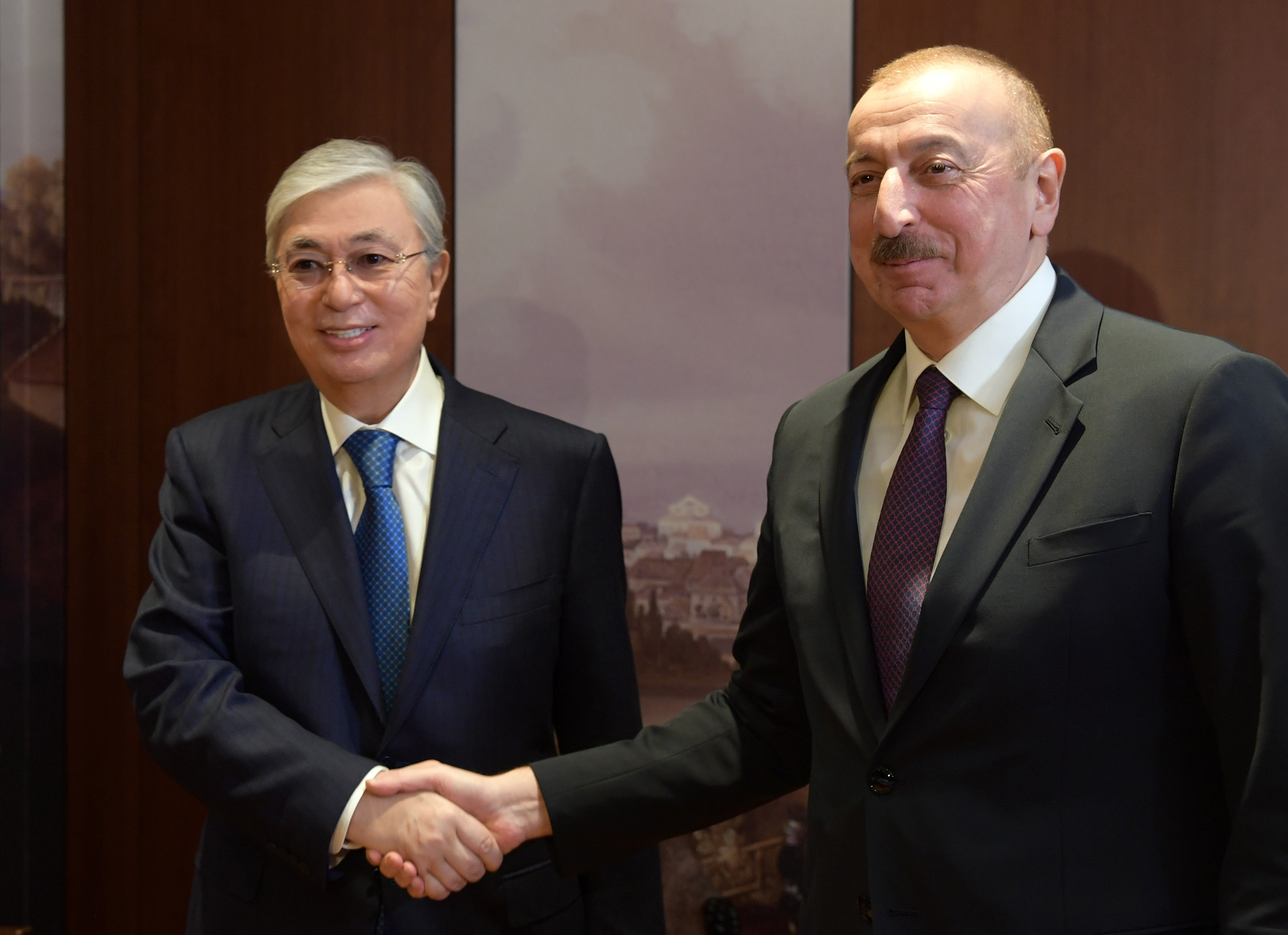ASTANA – President of Kazakhstan Kassym-Jomart Tokayev highlighted the prospects for bilateral cooperation in a March 10 interview with the Azerbaijani Press Agency (APA) ahead of the state visit to Baku. Tokayev emphasized the common cultural heritage of the two nations, the growing role of strategic initiatives in transport and transit cooperation, as well as the shared commitment to sustainable development.

Kassym-Jomart Tokayev and Ilham Aliyev during their working visits to Munich in February 2020. Photo credit: Akorda.
“The foundation for the successful development of our relations lies primarily in the centuries-old fraternal bonds between the Kazakh and Azerbaijani nations, the fruitful cooperation between our states over many years, and mutual support on the international stage,” said Tokayev.
Upbeat view on bilateral cooperation
The head of state underscored the significance of personal, trusting, and friendly relationship with President of Azerbaijan Ilham Aliyev. This fosters a deeper understanding across the entire spectrum of bilateral and multilateral cooperation, he noted.
In his presidential capacity, Tokayev paid the first official visit to Baku in August 2022. It was, “in a sense, a breakthrough for the partnership between Baku and Astana,” according to the Kazakh leader. The visit coincided with the 30th anniversary of diplomatic relations and marked the adoption of a declaration aimed at strengthening strategic ties and deepening allied cooperation between the two countries.
“Alongside traditional interaction mechanisms, we have established and launched the work of Business and Expert Councils. During my upcoming visit to Baku, we will initiate the work of the Supreme Interstate Council and convene its inaugural session,” he said.
Modern Kazakh-Azerbaijani relations are experiencing an upswing in political, trade and economic, transit and transport, energy, agricultural, and cultural and humanitarian cooperation.
Since 2020, the trade turnover has surged fivefold, from $109 million to $529 million. The legal framework is also steadily broadening, with nearly 40 bilateral documents signed for the last year and a half.
Partnership on the Middle Corridor and in the Caspian Sea
“In our portfolio, there are several projects of significant importance for both our countries and the region as a whole. These include expanding the capacity of the Trans-Caspian International Transport Route (TITR), laying fiber-optic communication lines (FOCL) and energy cables along the Caspian Sea bed, exporting oil and uranium through Azerbaijan, and supplying wheat from Kazakhstan to the Azerbaijani market,” said Tokayev.
For Kazakhstan, the development of TITR, also known as the Middle Corridor, is a strategic priority. The government activities are particularly focused on strengthening the country’s transportation and logistics capacities.
“Today, the significance of the Middle Corridor has surged in fostering and advancing transcontinental trade. This is demonstrated by the substantial growth in cargo transportation along the route, which doubled in 2022 and further increased by 65% in 2023, reaching 2.7 million tons of cargo,” said Tokayev.
For comparison, the cargo transportation through the multimodal route in 2022 totaled 1.7 million tons.
“In the foreseeable future, we anticipate that this level will reach 10 million tons. Both demand and technological capabilities support this projection. Therefore, Astana and Baku are taking comprehensive steps in this area,” he said.
Tokayev brought an example of the adoption of the roadmap for the synchronous elimination of the bottlenecks and the development of the Middle Corridor across the territories of Kazakhstan, Azerbaijan, and Türkiye until 2027, which was signed by the end of 2022.
“The further development of the route and its integration with other transport corridors are also seen as promising. This will provide additional opportunities for broader transregional integration of the South Caucasus and Türkiye with Kazakhstan, Central Asian countries, the Eurasian Economic Union (EAEU), and China,” said Tokayev.
Special attention will be paid to the comprehensive modernization of the Kazakh and Azerbaijani maritime ports along the Caspian coastline.
“Furthermore, railway organizations from Kazakhstan, Azerbaijan, and Georgia established the Middle Corridor Multimodal company to boost freight transportation volumes. This venture will facilitate services in a single window format,” he said.
It is also planned to introduce cutting-edge digital technologies along the route. “In this regard, we have partnered with the PSA transnational Singaporean company, renowned for developing a seamless digital corridor,” noted Tokayev.
Environmental agenda
When asked about the environmental agenda of the Caspian Sea, the Kazakh leader highlighted the importance of research regarding the sea level reduction, conservation of the Caspian seal population and ichthyofauna, as well as the improvement of the sea area and coast.
For this purpose, Tokayev initiated the establishment of the Scientific Research Institute of the Caspian Sea in Kazakhstan last year.
Both Kazakhstan and Azerbaijan share commitment to sustainable development, striving to mitigate the adverse effects of climate change and promote renewable energy sources. This November, Baku will organize the 29th Conference of the Parties to the United Nations Framework Convention on Climate Change (UNFCCC), more commonly known as COP29.
“We welcome Azerbaijan as the first Turkic state from the Commonwealth of Independent States (CIS) countries to be granted the opportunity to host such a significant event as COP29. In this regard, we see an excellent opportunity to learn from Azerbaijan’s experience in organizing major global environmental events, and we are ready to provide the necessary support,” he said.
In September 2024, Kazakhstan and France plan to host the One Water Summit on the sidelines of the United Nations General Assembly (UNGA). Apart from that, Tokayev proposed to hold a Regional Climate Summit in Kazakhstan in 2026 under the auspices of the United Nations (UN).
